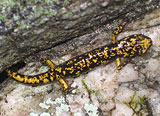The secret life of a camouflaged salamander

courtesy N.C. Wildlife Resources Commission
|
The green salamander, one of Western North Carolina’s endemic amphibians, spends daylight hours tucked away in dark crevices of rocky outcrops. It sometimes inhabits the cavities of decaying trees, concealed among lichens and mossy branches by its unusual smattering of black, yellow and olive drab. A nocturnal critter, it grows to be about five inches long and, like most salamanders, “breathes” through its skin.
Biologists are uncertain about the salamander’s exact abundance or habitat range, but it’s known to exist only in Western North Carolina, in clusters throughout Macon, Jackson and Transylvania counties. Its population is believed to be in decline, a trend that began as long as three decades ago.
In a recent field trip to Dupont State Forest hosted by the North Carolina Teaming With Wildlife Coalition, state biologists set out in search of the salamander as part of an ongoing effort to keep it — and a host of other key species — off the federal endangered-species list.
“There are certain species that are indicators of habitat decline,” explains Christopher North, coordinator of the North Carolina Teaming With Wildlife program. “We’re protecting entire habitats by looking at the species we know are declining and trying to prevent them from getting to that critical state.” Teaming With Wildlife, a national coalition of some 4,500 organizations, is spearheaded by the Association of Fish and Wildlife Agencies.
The initiative, says North, stems from State Wildlife Grants, a federal program that funds action plans for protecting key species and critical habitats in each state. The North Carolina Wildlife Action Plan was developed by the state Wildlife Resources Commission, and Teaming With Wildlife is working with them to implement it. “If this type of program was up and running 30 years ago, we would have a lot more biodiversity today,” says North.
For the state biologists monitoring the green salamander in Dupont State Forest and other habitat clusters, that means scouring every nook and cranny in hopes of spotting the rare species.
When ‘power and light’ takes on a whole new meaning
Cassandra Carmichael takes the issue of climate change to heart.
“As people of faith, we are asked not only to protect God’s creation, but to work for justice,” Carmichael, eco-justice program director for the National Council of Churches and a native of New Orleans, told a crowd that gathered in the parish hall at All Souls Episcopal Church on Nov. 28 to discuss climate change from a faith perspective. She displayed an image of an abandoned home in Chalmette, La., that appeared to be near collapse with tufts of marsh grass sprouting from the roof — one of the thousands of properties destroyed by Hurricane Katrina. “This is our crystal ball as you look into the future,” she said. “If you remember the images from the television, you’ll understand who will be impacted the most by climate change.”
Carmichael’s presentation, sponsored by All Souls, the North Carolina Council of Church’s Climate Connection and North Carolina Interfaith Power and Light, represents a growing movement within the Christian community to address global warming as a moral issue. For Christian environmentalists, taking steps to reduce carbon-dioxide emissions is part of caring for God’s creation.
In the past year, 10 congregations throughout Western North Carolina requested energy audits for their places of worship in an effort to reduce their consumption, according to Land-of-Sky Waste Reduction Partners Program Director Terry Albrecht. Meanwhile, a campaign launched by the Climate Connection encourages people of faith who celebrate Advent to replace one standard light bulb with an energy-saving compact fluorescent each time they light a ceremonial candle.
Richard Fireman of Caring for Creation stood up during the discussion to encourage people not to fall into “despair, sadness and hopelessness” while considering climate change. “I see this as the most unique time in the history of the human species to be alive,” he said. “Our actions or inactions hold huge consequences for future generations. What our faith holds for us is the power of a prophetic voice — the real voice of justice.”



Before you comment
The comments section is here to provide a platform for civil dialogue on the issues we face together as a local community. Xpress is committed to offering this platform for all voices, but when the tone of the discussion gets nasty or strays off topic, we believe many people choose not to participate. Xpress editors are determined to moderate comments to ensure a constructive interchange is maintained. All comments judged not to be in keeping with the spirit of civil discourse will be removed and repeat violators will be banned. See here for our terms of service. Thank you for being part of this effort to promote respectful discussion.